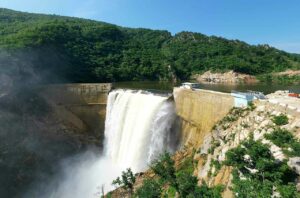On May 11, the Stimson Center and KAS-Multinational Development Policy Dialogue (MDPD) held the second session of its Joint Working Group (JWG) 2.0 high-level meeting series on Insights from Transboundary River Commissions and Organizations. The JWG 2.0 series, launched earlier in March, is a step forward towards setting up a platform for peer-to-peer exchanges and enterprising dialogues between river commissions, river basin organizations, thought leaders, and regional and international policy shapers to jointly identify shared water challenges and explore collaborative solutions.
The second session, carried under Chatham House Rules, invited perspectives from top officials representing L’Organisation pour la mise en valeur du fleuve Sénégal (OMVS), the Interstate Commission for Water Coordination of Central Asia (ICWC), and the Mekong River Commission (MRC).
The OMVS was established in 1972 as an intergovernmental organization to manage the Senegal River Basin. It has a commendable institutional structure with multiple governing bodies which work to facilitate the economic advancement of member states through joint development of the river basin while ensuring the overall preservation of the Senegal River system. The OMVS’ Permanent Water Commission (PWC) periodically gathers representatives of the Member States and of the OMVS to have timely discussions on the principles and arrangements for allocation of water resources to various sectors as well as to review all rules for the quantitative and qualitative conservation of the river waters. For the OMVS, strong political will has been a key driver of its successful endeavors so far—yet challenges like funding assistance and legislative issues can sometimes pose major deterrents.
Similarly, the ICWC, a body operating under the Board of International Fund for Aral Sea and the Heads of Central Asian states, works to define regional water policies which support all economic sectors while safeguarding water resources. The ICWC stands out for its proactive approach towards establishing joint institutions where Central Asian member counties can pragmatically discuss shared waters without political biases. The ICWC also mandates regular knowledge sharing and technical interactions between riparian states. Nevertheless, the institution’s limited jurisdiction over the rivers and control over national implementation can often be a challenge to work through.
Correspondingly, the MRC’s work is grounded in promoting and coordinating sustainable development and management of water and related resources of the Mekong River Basin in mainland Southeast Asia. Creation of commission’s Basin Development Strategy, which prioritizes strengthening resilience against climate risks and maintaining the ecological function of the Mekong, has emerged as a key success in recent years in terms of stakeholder engagement and policy implementation. However, there remains a strong need for coordinated operation and management between countries as climate and water risks intensify.
The discussion commenced with each participating commission and regional body sharing their respective mandates, objectives, and governance principles with the group—some of which are noted above. The participants also used this opportunity to communicate successful collaborative initiatives that they have brokered in the recent past as well as raise outstanding challenges that they would like to discuss with their peers from other river basins.
Working group participants unanimously agreed that water issues are inherently multifaceted and hence can sometimes fall prey to political tensions and diplomatic deadlocks. Sometimes initiatives are put into the pipeline but never get judiciously implemented as governments change and new administrations can take a long time to acclimatize. Participants further flagged concerns for the future, specifically that the uncertainty of the shifting geopolitical landscape coupled with exacerbating climate change could lead to a multitude of onerous situations such as water-induced migration and increased food insecurity. Therefore, timely adaptation and capacity-building mechanisms require meticulous political foresight and adequate funding for joint river institutions.
There was collective support for regular cross-basin dialogues, improved peer-to-peer connectivity, and creation of avenues for multi-stakeholder engagement with an important role for think tanks and the private sector. Participants agree that wider and more inclusive debates which eventually lead to policy recommendations are necessary in every region/basin for effective transboundary river water governance.
As next steps, KAS-MDPD and the Stimson Center will utilize all the key takeaways from our two meetings to design our JWG 2.0 dialogue, scheduled for late Summer, which will invite a larger participation of stakeholders and multiple perspectives from beyond the regional commissions. Through our project, we aim to promote inter-regional dialogues, facilitate greater information sharing between river basins with parallel circumstances and challenges, and help prepare them for the future of water diplomacy and transboundary rivers.



